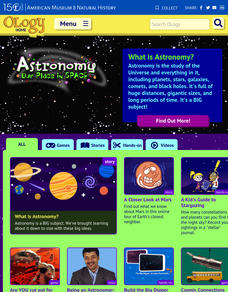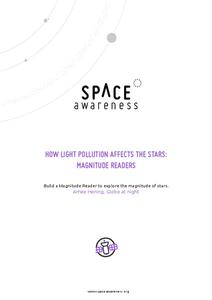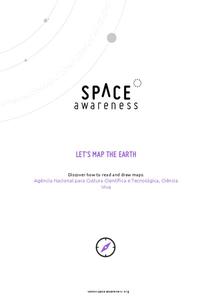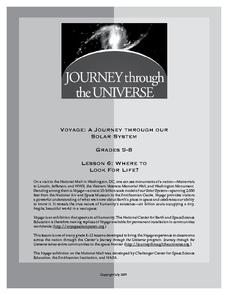Colorado State University
How Far Away Is Space?
Outer space may be a lot closer than you think! Science scholars model the layers of the atmosphere using transparencies to gain insight into the scale of space. The resource includes ideas to tailor the activity to the skill level of...
PHET
Earth’s Magnetic Field from Space
Feel the pull of science! The final installment of this 18-part series is an application of everything learned in the previous high school lessons. Scholars are given a magnetic field map and must propose an arrangement of magnets that...
Curated OER
The Trash We Pass
Where does our garbage go? What is the difference between a recyclable and non-recyclable item? Pose these important, but often overlooked, questions to your class and invite them to consider the lasting and damaging effects of the...
NASA
Lights on the International Space Station
Groups explore illumination with NASA's Lighting Environment Test Facility (LETF) as a context. Using the TI-Nspire app, groups determine the lux equation that models their simulation. They then use the lux equation to solve problems...
Teach Engineering
An Inflated Impression of Mars
Help your class understand the magnitude of the distance between Earth and Mars with an activity that asks small groups to use balloons to create scale models of the Earth, Moon, and Mars. Class members figure out the distances between...
NASA
Space Vectors
How do you determine the position coordinates of objects in space? Using the provided worksheet, class members determine the location of the space shuttle based upon its spherical coordinates from the Dryden Flight Research Center.
Curated OER
Get a Leg Up
Traveling through space is an amazing experience, but it definitely takes a toll on the body. After reading an article and watching a brief video, learners perform an experiment that simulates the effects of zero gravity on the human body.
Curated OER
Food for Spaceflight
When astronauts get hungry in outer space, they can't just call and have a pizza delivered. In order to gain an appreciation for the challenges associated with space travel, young learners are given the task of selecting, testing, and...
Columbus City Schools
Moon Phase Mania
Now you see it, now you don't. Our moon seems to pull a disappearing act from time to time—but why? Take your seventh grade scientists above and beyond to discover the truth about the moon and the role it plays in Earth's little corner...
NASA
Rendezvous For Two
Imagine the challenge of getting the space shuttle to rendezvous with the International Space Station. Groups must determine the elliptical transfer orbit needed to get the space shuttle from its orbit to the orbit of the International...
NASA
Let's Investigate Mars
Take your science class on a hypothetical field trip to Mars with an engaging astronomy lesson. After first learning about NASA's Mars rover missions, young scientists plan their own scientific investigations of Earth's nearest neighbor.
Center for Math and Science Education
Solar System Launch
Trying to understand the vastness of outer space can be quite a challenge for young scientists. Help put things in perspective with this cross-curricular activity as students work in pairs creating scaled models of the solar system,...
Curated OER
Moon Mining
Go on a moon mining expedition from the safety of your classroom with this space exploration simulation. Using simple models of the moon's surface prepared ahead of time by the teacher, young scientists are challenged with locating and...
American Museum of Natural History
Planetary Mysteries
A website all about planetary mysteries—it's a one-stop-shop for all things, stars, planets, and space travel. Scholars read an astronomy overview to discover the page's big ideas, then choose from the plethora of resources, including...
Space Awareness
How Light Pollution Affects the Stars: Magnitude Readers
Did you know light can decrease visibility? Light pollution absolutely makes it more difficult to see stars. Scholars build a simple magnitude reader to determine the magnitude of stars. They use these data to estimate the impact of...
Space Awareness
Let's Map the Earth
Before maps went mobile, people actually had to learn how to read maps. Pupils look at map elements in order to understand how to read them and locate specific locations. Finally, young cartographers discover how to make aerial maps.
EduGAINs
Go H2O! Investigating Residential Water Systems
Before your learners excuse themselves to get a drink at the water fountain, prompt them to think about where that water comes from. A middle school science instructional activity encourages groups to research their community's source of...
NASA
Cleaning Water
From their sweat to the water vapor in their breath, astronauts recycle every possible drop of water while in space. After watching a short video describing the different ways materials are recycled and reused in space shuttles, young...
NASA
Is It Alive?
Determining whether or not something is living can be more difficult than it seems. Put your young scientists to work defining their own criteria to identify life, then work with three samples to see if they are alive or not.
Curated OER
Making Regolith
You may not be able to take a field trip to the moon, but that doesn't mean your class can't study moon rocks. Using graham crackers as the moon's bedrock and powdered donuts as micrometeorites, young scientists simulate the creation of...
Journey Through the Universe
Where to Look For Life?
Every year we discover new planets including more than 1,000 in 2016 alone. Will we ever find life on another planet? The lesson includes two activities to help scholars understand this concept. First, they analyze the temperature range...
Curated OER
Doin' The Moonwalk
If you are looking for an outstanding lesson plan on the Moon for your budding astronomers, look no further! This outstanding plan is full of wonderful, meaningful activities for your charges to engage in. Pupils will discover why there...
Space Awareness
Coma Cluster of Galaxies
Scientists classify everything from the smallest cells to the largest galaxies, but how do they decide on a classification system? Scholars use 40 pictures of galaxies taken by the Hubble Space Telescope to sort and try creating their...
Science Matters
Thermal Energy Flow in Materials
The sun sends the earth 35,000 times the amount of energy required by all of us on the entire planet, every day. The fourth lesson in the 10-part series looks at how light energy from the sun transfers into thermal energy. Scholars build...

























